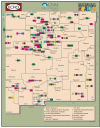Expanding access to hepatitis C virus treatment--Extension for Community Healthcare Outcomes (ECHO) project: disruptive innovation in specialty care
- PMID: 20607688
- PMCID: PMC3795614
- DOI: 10.1002/hep.23802
Expanding access to hepatitis C virus treatment--Extension for Community Healthcare Outcomes (ECHO) project: disruptive innovation in specialty care
Abstract
The Extension for Community Healthcare Outcomes (ECHO) Model was developed by the University of New Mexico Health Sciences Center as a platform to deliver complex specialty medical care to underserved populations through an innovative educational model of team-based interdisciplinary development. Using state-of-the-art telehealth technology, best practice protocols, and case-based learning, ECHO trains and supports primary care providers to develop knowledge and self-efficacy on a variety of diseases. As a result, they can deliver best practice care for complex health conditions in communities where specialty care is unavailable. ECHO was first developed for the management of hepatitis C virus (HCV), optimal management of which requires consultation with multidisciplinary experts in medical specialties, mental health, and substance abuse. Few practitioners, particularly in rural and underserved areas, have the knowledge to manage its emerging treatment options, side effects, drug toxicities, and treatment-induced depression. In addition, data were obtained from observation of ECHO weekly clinics and database of ECHO clinic participation and patient presentations by clinical provider. Evaluation of the ECHO program incorporates an annual survey integrated into the ECHO annual meeting and routine surveys of community providers about workplace learning, personal and professional experiences, systems and environmental factors associated with professional practice, self-efficacy, facilitators, and barriers to ECHO. The initial survey data show a significant improvement in provider knowledge, self-efficacy, and professional satisfaction through participation in ECHO HCV clinics. Clinicians reported a moderate to major benefit from participation. We conclude that ECHO expands access to best practice care for underserved populations, builds communities of practice to enhance professional development and satisfaction of primary care clinicians, and expands sustainable capacity for care by building local centers of excellence.
Figures
References
-
- Crook ED, Peters M. Health disparities in chronic diseases: where the money is. American Journal of Medical Science. 2008 Apr;355(4):266–70. - PubMed
-
- Whitcomb ME. The challenge of providing doctors for rural America. Academic Medicine. 2005;80(8):715–716. - PubMed
-
- Smedley BD, Stith AY, Nelson AR, editors. Unequal treatment: confronting racial and ethnic disparities in health care. Institute of Medicine, The National Academies Press; Washington DC: 2002. - PubMed
-
- Strong K, Mathers C, Leeder S, et al. Preventing chronic disease: how many lives can we save? Lancet. 2005;366:1578–82. - PubMed
-
- USDA Economic Research Services. 2009 http://www.ers.usda.gov/statefacts/nm.htm.
Publication types
MeSH terms
Grants and funding
LinkOut - more resources
Full Text Sources
Medical
Research Materials


